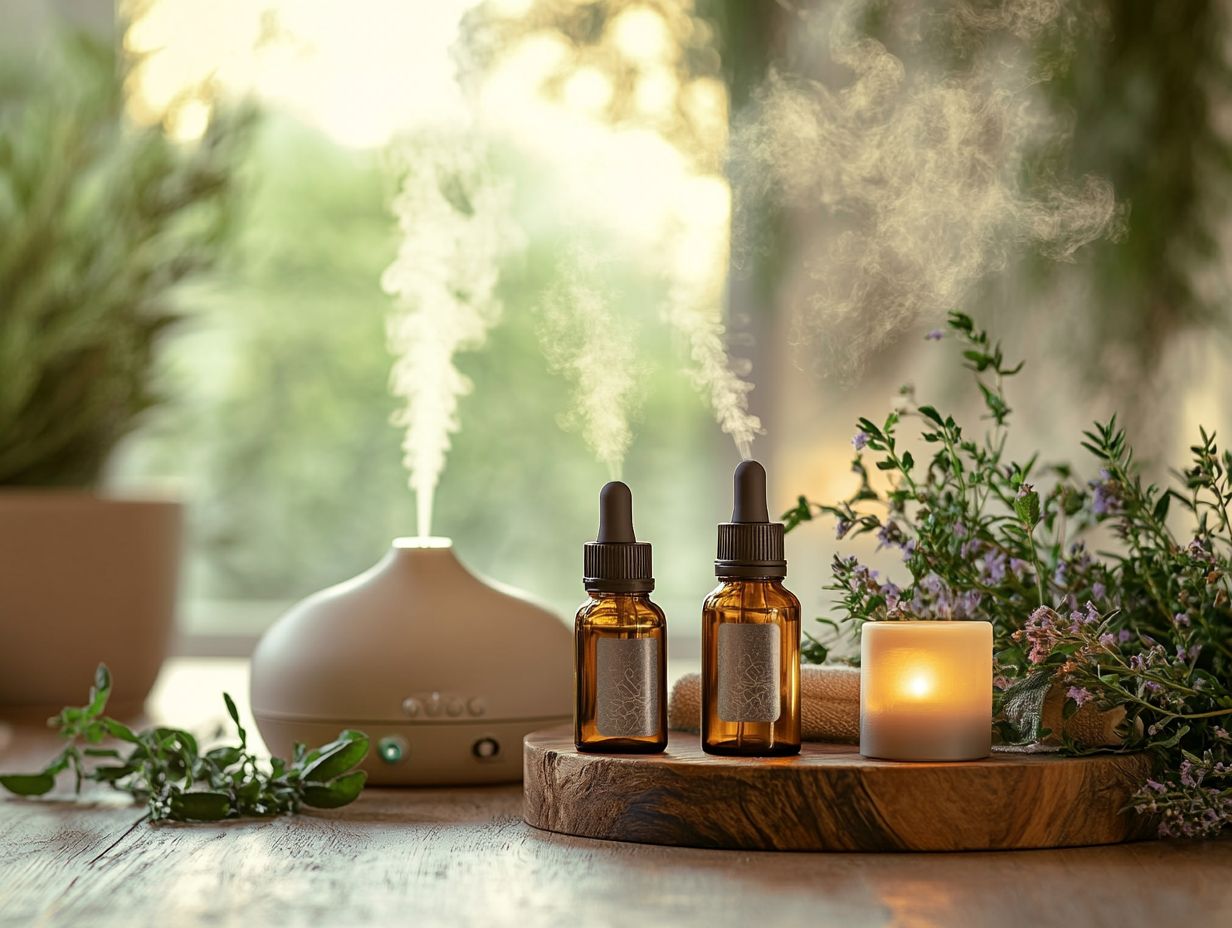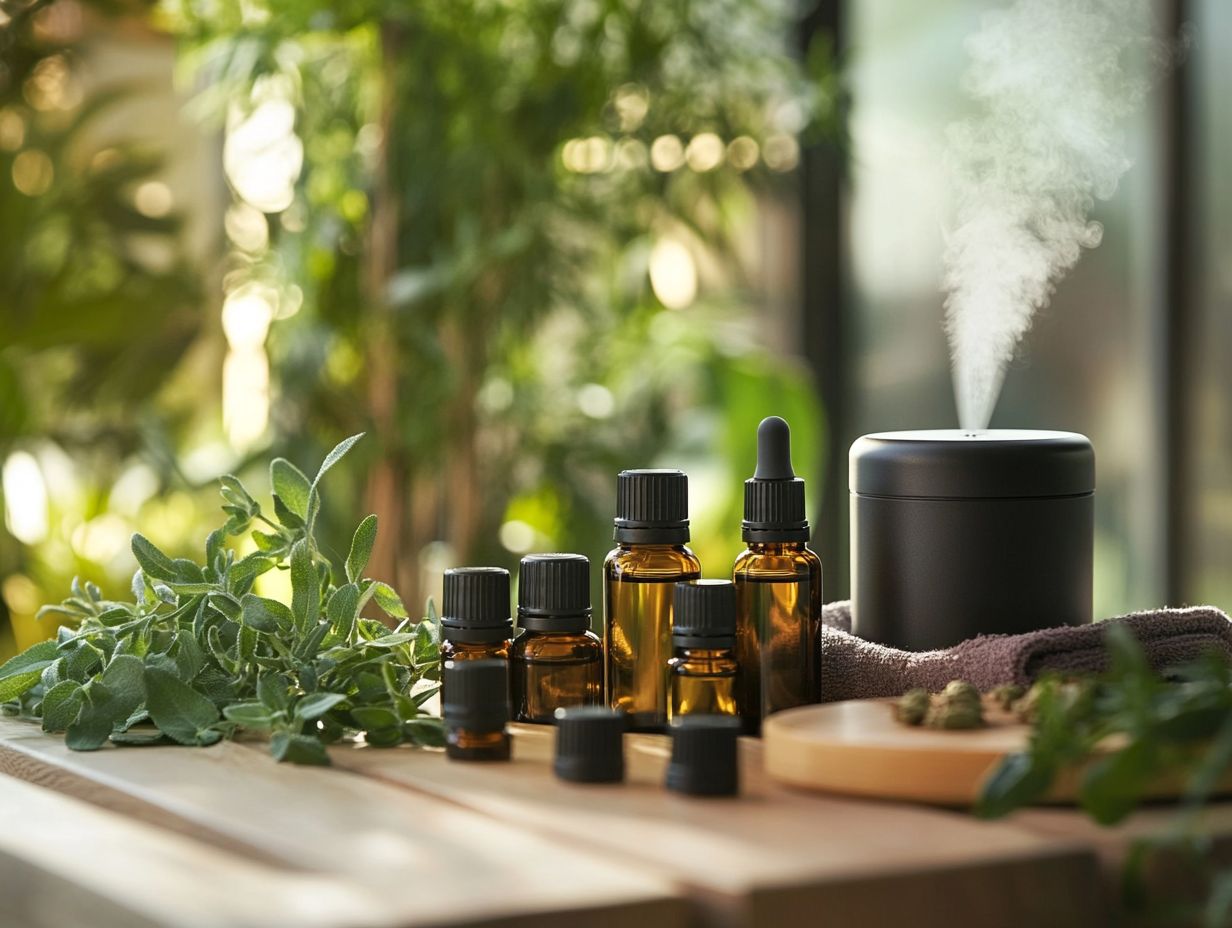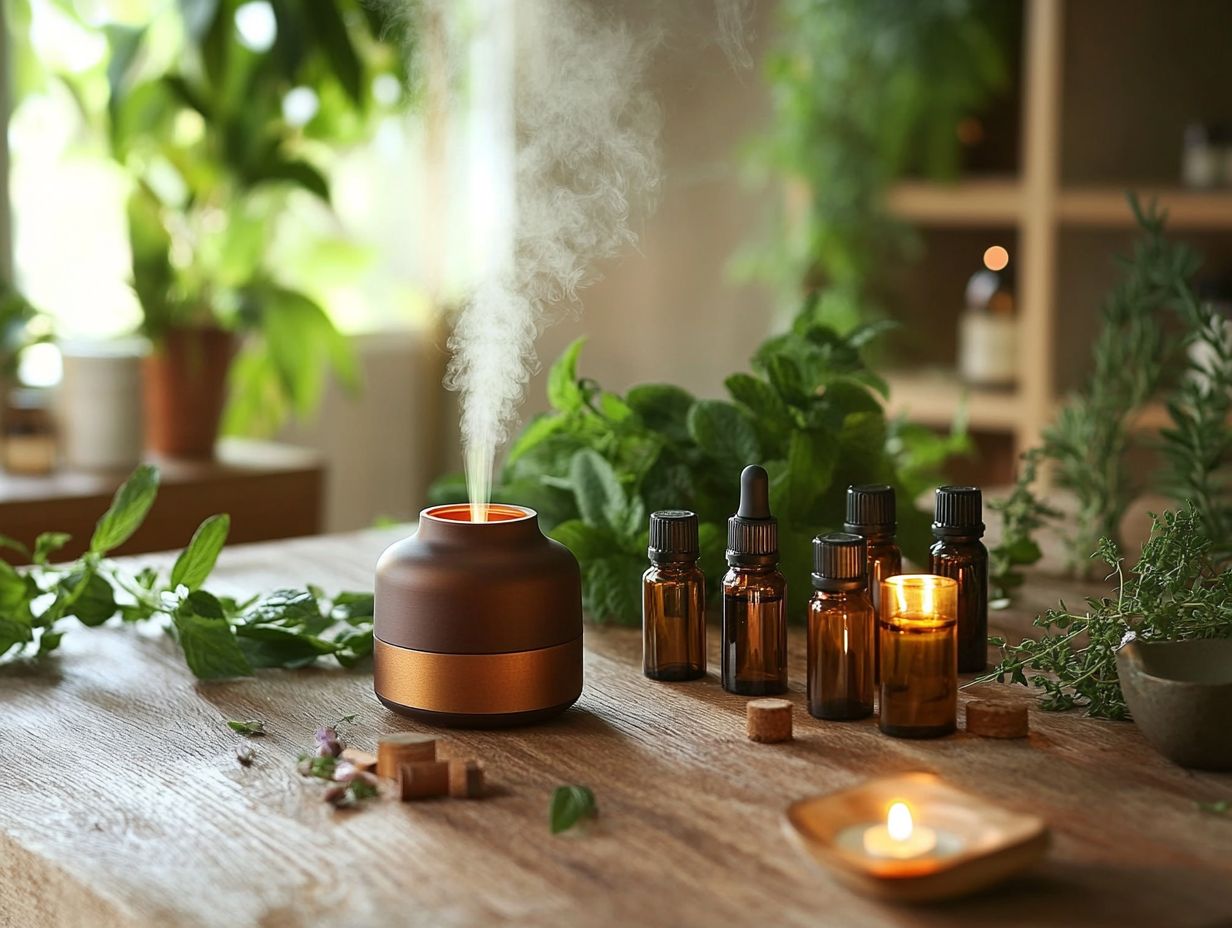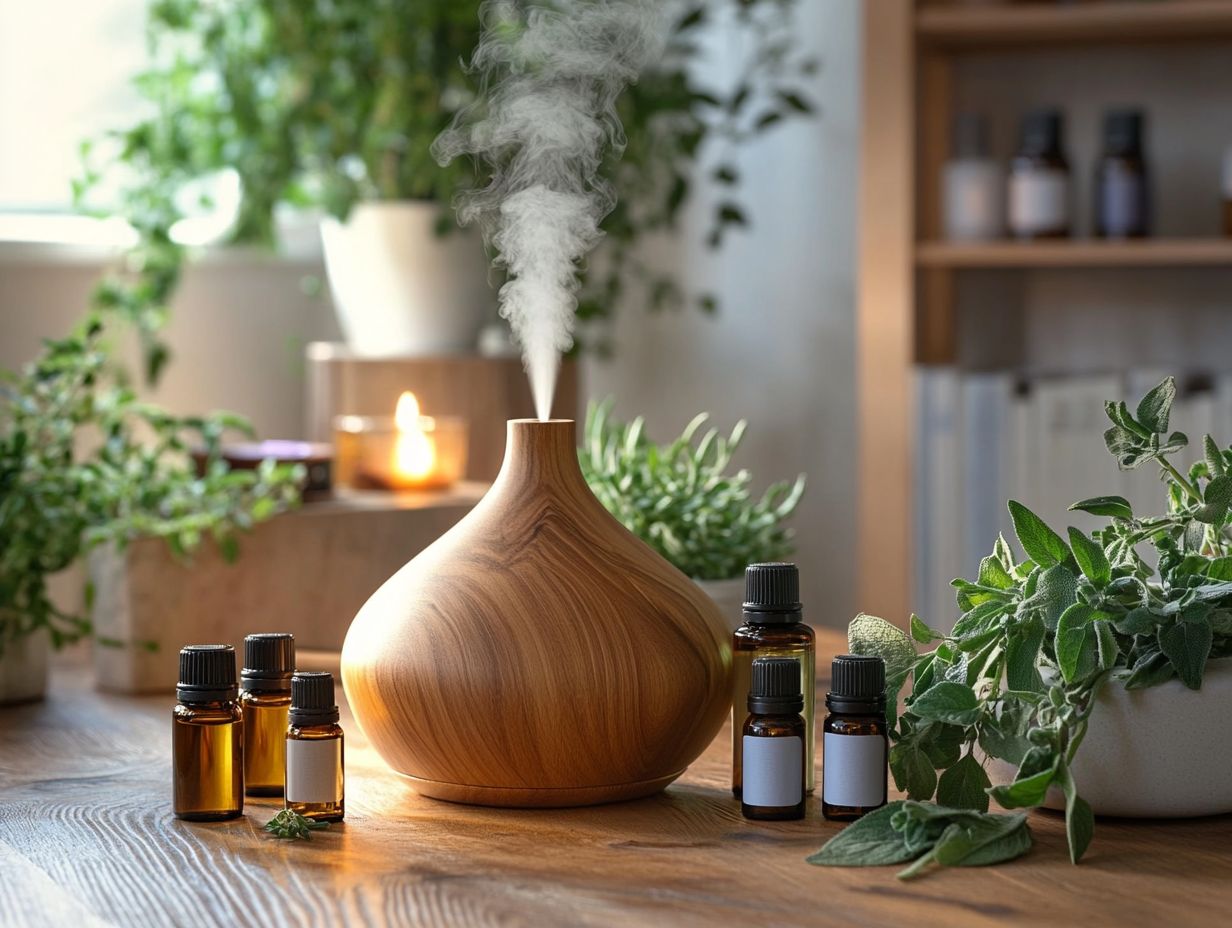46. How to Use Aromatherapy in Integrative Health
In today’s fast-paced world, your pursuit of holistic health has likely gained traction. Aromatherapy has a rich history and versatile applications, enhancing traditional therapies and supporting your overall health.
Dive into this article to discover the amazing benefits of aromatherapy! Explore its importance within integrative health, revealing the top essential oils for your various concerns and discussing effective methods of application.
You will find insights into safety considerations and practical suggestions for seamlessly weaving aromatherapy into your daily self-care routine. This fosters a more balanced and harmonious lifestyle.
Contents
- Key Takeaways:
- Integrative Health and Aromatherapy
- Why Essential Oils Matter for Your Health Journey
- Methods of Aromatherapy
- Combining Aromatherapy with Other Therapies
- Safety Considerations for Aromatherapy
- Integrating Aromatherapy into Daily Life
- Frequently Asked Questions
- 1. What is aromatherapy and how does it relate to integrative health?
- 2. How do I use aromatherapy as part of my integrative health routine?
- 3. Which essential oils are commonly used in aromatherapy for integrative health?
- 4. Are there any safety precautions to keep in mind when using aromatherapy for integrative health?
- 5. Can aromatherapy be used in conjunction with other treatments in integrative health?
- 6. Are there any potential benefits of using aromatherapy in integrative health?
Key Takeaways:

Aromatherapy can play a key role in holistic health by promoting physical, mental, and emotional well-being.
Essential oils can be used to address various health concerns such as stress, anxiety, pain, and sleep issues. When used safely and in combination with other therapies, aromatherapy can enhance the effectiveness of treatments for a range of health conditions.
Integrative Health and Aromatherapy
Integrative health combines traditional medicine with alternative treatments like aromatherapy. This approach enhances well-being and is vital for holistic healing.
Healthcare providers frequently recommend aromatherapy as an additional therapy, enriching patient-centered care especially for those seeking emotional and physical healing.
By weaving together various therapeutic interventions, aromatherapy improves relaxation techniques and aids in stress reduction and emotional support. This ultimately paves the way for a healthier lifestyle.
Understanding the Role of Aromatherapy in Holistic Health
Aromatherapy plays an essential role in your holistic health journey, offering both emotional and physical healing through the remarkable therapeutic properties of essential oils.
These oils, derived from plants, flowers, and herbs, are full of compounds that can elevate your mood, reduce stress, and improve your overall well-being.
Take lavender oil, for example; it is known for its calming effects, making it ideal for anxiety or sleepless nights. On the other hand, eucalyptus oil offers invigorating properties that help clear your airways and boost your vitality.
Peppermint oil is a popular remedy for relieving headaches and enhancing concentration. By incorporating these oils into your daily routine, you can address various health issues while fostering balance and harmony within your mind and body.
Why Essential Oils Matter for Your Health Journey
Essential oils serve as remarkable allies in integrative health, renowned for their ability to relieve pain, elevate mood, and promote overall well-being through various therapeutic interventions.
Embracing these potent tools can significantly enhance your wellness journey, offering a holistic approach to health that resonates on multiple levels.
Top Essential Oils for Different Health Concerns
Essential oils like lavender, ginger, and chamomile are packed with therapeutic benefits that can address various health concerns. Lavender oil, for instance, is renowned for its calming effects and is often your best ally in relieving stress, promoting restful sleep, and easing headaches.
Then there s ginger oil, celebrated for its anti-inflammatory properties, making it your go-to remedy for muscle pain and digestive issues. Chamomile, with its soothing aroma, is a favorite in relaxation techniques, offering anxiety relief and enhancing your emotional well-being.
By incorporating these essential oils into your daily routines whether through inhalation, massage, or diffusion you can discover effective solutions for pain management and stress reduction, ultimately elevating your overall quality of life.
Methods of Aromatherapy

Aromatherapy methods include inhalation and applying oils to the skin. These techniques guarantee the safety and effectiveness of essential oils.
This careful approach ensures you enjoy the full benefits of these wonderful oils.
Inhalation, Topical Application, and More
Inhalation and topical application are primary aromatherapy methods. They enhance your emotional support and physical healing.
Simply breathe in essential oils or apply them to your skin to access nature’s powerful remedies.
Inhalation impacts your sense of smell, triggering emotions that can boost your mood and ease anxiety. Topical application helps oils reach deeper skin layers for relief and better health.
To make the most of these methods, try mindfulness practices like deep breathing or meditation. They beautifully complement essential oils and can help reduce stress.
Combining Aromatherapy with Other Therapies
Combining aromatherapy with other therapies enhances healthcare. This approach, including insights from how traditional medicine fits into integrative health, boosts holistic healing.
Use essential oils with traditional methods for a richer, more effective healing experience.
This combination not only improves well-being but also deepens your connection to your emotional and physical health.
How Aromatherapy Can Enhance Other Treatments
Aromatherapy enhances treatment experiences, reduces stress, manages anxiety, and relieves pain.
For instance, using lavender oil during physical therapy can help relax your muscles. This lets you engage better in your rehab exercises.
Research shows patients using aromatherapy with physical therapy reported a 30% drop in pain and greater satisfaction.
Essential oils like bergamot can ease anxiety during therapy sessions.
One patient shared that aromatherapy with talk therapy led to deeper emotional connections and breakthroughs.
Safety Considerations for Aromatherapy
Understanding essential oil safety is crucial in aromatherapy. By prioritizing this knowledge, you can effectively mitigate potential risks and ensure adherence to FDA guidelines concerning chemical safety.
Potential Risks and Precautions

Essential oils offer health benefits but come with risks. These powerful oils can cause skin irritation or allergic reactions. They may also interact with some medications, such as blood thinners or antidepressants.
Always consult a healthcare provider if you have conditions or take medications before using essential oils.
Careful consideration is key when adding essential oils to your treatment plan.
Integrating Aromatherapy into Daily Life
Incorporating aromatherapy into your daily routine can enhance self-care, promote relaxation, and encourage mindfulness. These practices contribute significantly to your overall well-being.
Incorporating Aromatherapy into Self-Care Practices
Incorporating aromatherapy into your self-care practices will instantly boost your relaxation techniques and provide invaluable emotional support.
By utilizing natural plant extracts like lavender, chamomile, and bergamot, you can create a soothing environment that effectively alleviates stress and anxiety.
You can also enhance your routines by using these delightful scents during meditation or yoga sessions. This practice cultivates a profound sense of calm and peace.
Create unique blends of essential oils to match your feelings. This personal touch makes your self-care routine more effective.
The act of inhaling these aromatic compounds can trigger positive emotional responses. This fosters mental clarity and emotional resilience throughout your day.
Frequently Asked Questions
1. What is aromatherapy and how does it relate to integrative health?
Aromatherapy is the use of natural plant extracts for therapeutic purposes. It can be used in integrative health as a complementary therapy, meaning it is used alongside other treatments to promote overall well-being.
2. How do I use aromatherapy as part of my integrative health routine?

There are several ways to incorporate aromatherapy into your integrative health practices. You can use essential oils through inhalation methods such as diffusers or steam inhalation. Additionally, exploring 5 essential oils for integrative health benefits can enhance your experience, and you can apply them topically through massage, baths, or compresses.
3. Which essential oils are commonly used in aromatherapy for integrative health?
Some commonly used essential oils in aromatherapy include lavender for relaxation, peppermint for pain relief, and tea tree for its antiseptic properties. However, your choice of essential oils may vary based on your unique needs and preferences.
4. Are there any safety precautions to keep in mind when using aromatherapy for integrative health?
Yes, it is important to use essential oils safely. Always dilute them properly before applying topically, and do a patch test on a small area of skin first. Be mindful of any allergies or sensitivities you may have, and consult with a healthcare professional before use.
5. Can aromatherapy be used in conjunction with other treatments in integrative health?
Yes, aromatherapy can be used alongside other treatments in integrative health. It is often employed as a complementary therapy to enhance the effects of treatments like massage or acupuncture, as discussed in the science behind integrative health practices.
6. Are there any potential benefits of using aromatherapy in integrative health?
Absolutely, aromatherapy has shown various potential benefits, including reducing stress and anxiety, improving sleep, and relieving pain and inflammation. However, more research is needed to fully understand its effects.
Ready to explore the benefits of aromatherapy? Start incorporating these natural extracts into your self-care routine today!






